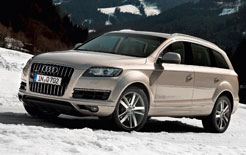AUDI’S huge seven-seater Q7 is downsizing on emissions but upsizing on efficiency.
The increased efficiency is part of a programme of 2011 model year changes for the Audi Q7 SUV.
These changes include more economical diesels, new petrol engines, and standard eight-speed tiptronic transmissions for the luxury SUV.
The latest 3.0-litre V6 TDI sees an impressive 19% increase in fuel economy, thanks to lighter weight contrstuction and stop-start technology. Developing 240PS and 550 Nm torque, the 3.0-litre TDI is impressively quick to 62mph in 7.9 seconds. Average economy is 38.2mpg; CO2 emissions are 195g/km.
A 3.0 TDI Clean Diesel is also available which meets future Euro6 emissions standards thanks in part to a DeNox catalyser – a focus of the future fuel regs. However, fuel economy is 33.6mpg, while CO2 is 219g/km (down from 234g/km).
The stonking Q7 4.2 TDI features uprated torque, lifted to a staggering 800Nm while also gaining improved fuel economy, up from 28.5mpg to 30.7mpg.
Meanwhile it’s all change on the petrol engine front with the introduction of two new supercharged 3.0-litre TFSI engines to replace the naturally aspirated 3.6-litre FSI and 4.2-litre FSI petrol units.
While the engines have been downsized, supercharging compensates for the smaller capactiy to make them not only quicker 0-62mph, but up to 16% more fuel efficient than the engines they replace.
The first of the supercharged V6 units replaces the 280PS 3.6-litre FSI, and offers 272PS and 400Nm. The more powerful version takes over from the 4.2-litre FSI and delivers 333PS and 440Nm of torque.
Both versions provide fuel economy of 26.4mpg, and improved CO2 emissions of 249g/km.
A new eight-speed automatic transmission provides greater efficiency. Drivers can choose between ‘D’ and ‘S’ modes, or make their own gear shifts in ‘manual’ mode via the gear lever or the optional steering-wheel paddles.
Audi Q7 2001 Model Year changes
- Priced from £40,135 OTR to £54,055 OTR
- Available to order for June delivery
- Newly developed 3.0-litre TDI engine brings 19 per cent economy gain helped by new engine start-stop system
- Two new supercharged 3.0-litre TFSI petrol engines replace 3.6 FSI and 4.2 FSI units, and bring economy improvements of 12 and 16% respectively
- New eight-speed tiptronic transmission with wider overall spread of ratios for more relaxed cruising and improved economy
Further information
The new Audi Q7 2011 Model Year price list is available as a download. To access the pdf, click on the following link and the download will commence automatically: Audi Q7 2011 Model Year prices
You can read additional commentary in the Editor’s Blog New Audi Q7: already sold out.
Audi Q7 gets new engines, better economy







